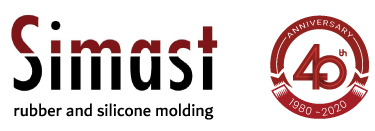Simast produces any item according to design using any elastomer available on the market and supports the customer in the selection of the most suitable material for the use and the final result, offering customised solutions.
The constant research and the experience gained in over thirty years, have brought the Company to use the best materials available on the market, produced by leading qualified companies which provide, together with the product, the certificates of conformity with the requirements set out by the main international supervisory bodies (e.g. conformity for medical use or food grade certification).
Thanks to the internal department for mix production, and the continuous commitment in the study of new materials, Simast boasts the ability to produce mixes according to the specific requests of the customer, even for small quantities.
However, we are available to use the materials indicated and/or provided directly by the customer.
The following is a list of the elastomers commonly used in rubber molding:
CODE:
NR
COMMERCIAL NAME:
Natural Rubber
OPERATING TEMPERATURES:
-60° to + 80° C
AVAILABLE HARDNESS:
25 to 90 Sh A
APPRECIATION:
Excellent resistance to compression, excellent elasticity, fair resistance to abrasion, good friction capacity.
DISADVANTAGES:
Not resistant to oils and UV radiations
FIELDS OF USE:
All products requiring exceptional elastic qualities
CODE:
SBR
COMMERCIAL NAME:
Styrene rubber
OPERATING TEMPERATURES:
-35° to + 80° C
AVAILABLE HARDNESS:
40 to 90 Sh A
APPRECIATION:
Good resistance to the water and to the braking system fluids used in the automotive industry
DISADVANTAGES:
Poor resistance to oils, UV radiations, water and weather agents.
FIELDS OF USE:
Tires, seals for braking systems
CODE:
NBR
COMMERCIAL NAME:
Nitrile or oil-proof rubber
OPERATING TEMPERATURES:
-40° to + +110° C
AVAILABLE HARDNESS:
30 to 90 Sh A
APPRECIATION:
Excellent resistance to compression, tearing and abrasion.
DISADVANTAGES:
Limited resistance to heat; suffers weathering.
FIELDS OF USE:
All uses where resistance to oils is required, automotive industry.
CODE:
HNBR
COMMERCIAL NAME:
Hydrogenated nitrile rubber
OPERATING TEMPERATURES:
-35° to + +130° C
AVAILABLE HARDNESS:
30 to 90 Sh A
APPRECIATION:
Excellent resistance to compression, tearing and abrasion, resistance to temperatures greater than that of NBR
DISADVANTAGES:
Limited resistance to heat; suffers weathering.
FIELDS OF USE:
All uses where resistance to oils is required, automotive industry.
CODE:
CR
COMMERCIAL NAME:
Neoprene®
OPERATING TEMPERATURES:
-20° to + +95° C
AVAILABLE HARDNESS:
30 to 90 Sh A
APPRECIATION:
Excellent resistance to ammonia, fair resistance to oils, good resistance to weather agents.
DISADVANTAGES:
Not compatible with solvents.
FIELDS OF USE:
Widely used in the scuba diving industry for wet suits.
CODE:
EPDM
COMMERCIAL NAME:
Dutral Ter
OPERATING TEMPERATURES:
-45° to + +140° C
AVAILABLE HARDNESS:
40 to 90 Sh A
APPRECIATION:
Excellent resistance to weather agents, good elasticity even at low temperatures; it can withstand relatively high temperatures and most of the commonly used chemical agents.
DISADVANTAGES:
No resistance to acids, solvents and petroleum oils.
FIELDS OF USE:
This elastomer is one of the most commonly used, because of its good cost/quality ratio. Available in food grade version.
COMMERCIAL NAME:
Silicone
OPERATING TEMPERATURES:
-60° to + +220° C
AVAILABLE HARDNESS:
20 to 85 Sh A
APPRECIATION:
Excellent resistance to extreme temperatures, good resistance to compression and water; hygiene, food and medical.
DISADVANTAGES:
Limited elasticity.
FIELDS OF USE:
The silicone is used for multiple uses, in the medical, food, hygiene industry, and wherever an excellent resistance to extreme temperatures is required.
CODE:
FKM/FPM
COMMERCIAL NAME:
Viton®, Tecnoflon®
OPERATING TEMPERATURES:
-30° to + +230° C
AVAILABLE HARDNESS:
55 to 95 Sh A
APPRECIATION:
Excellent resistance to extreme temperatures, excellent resistance to chemical agents, solvents and acids.
DISADVANTAGES:
Not flexible at low temperatures. It cannot be used in hot water.
FIELDS OF USE:
Resistant to most chemical agents, acids and petrols.
